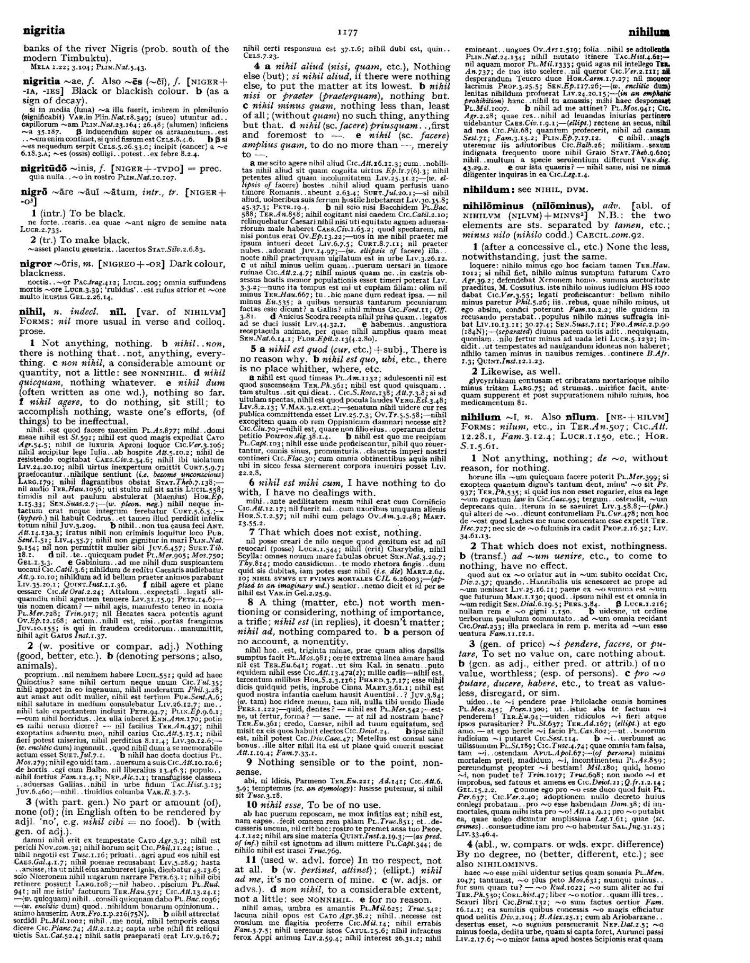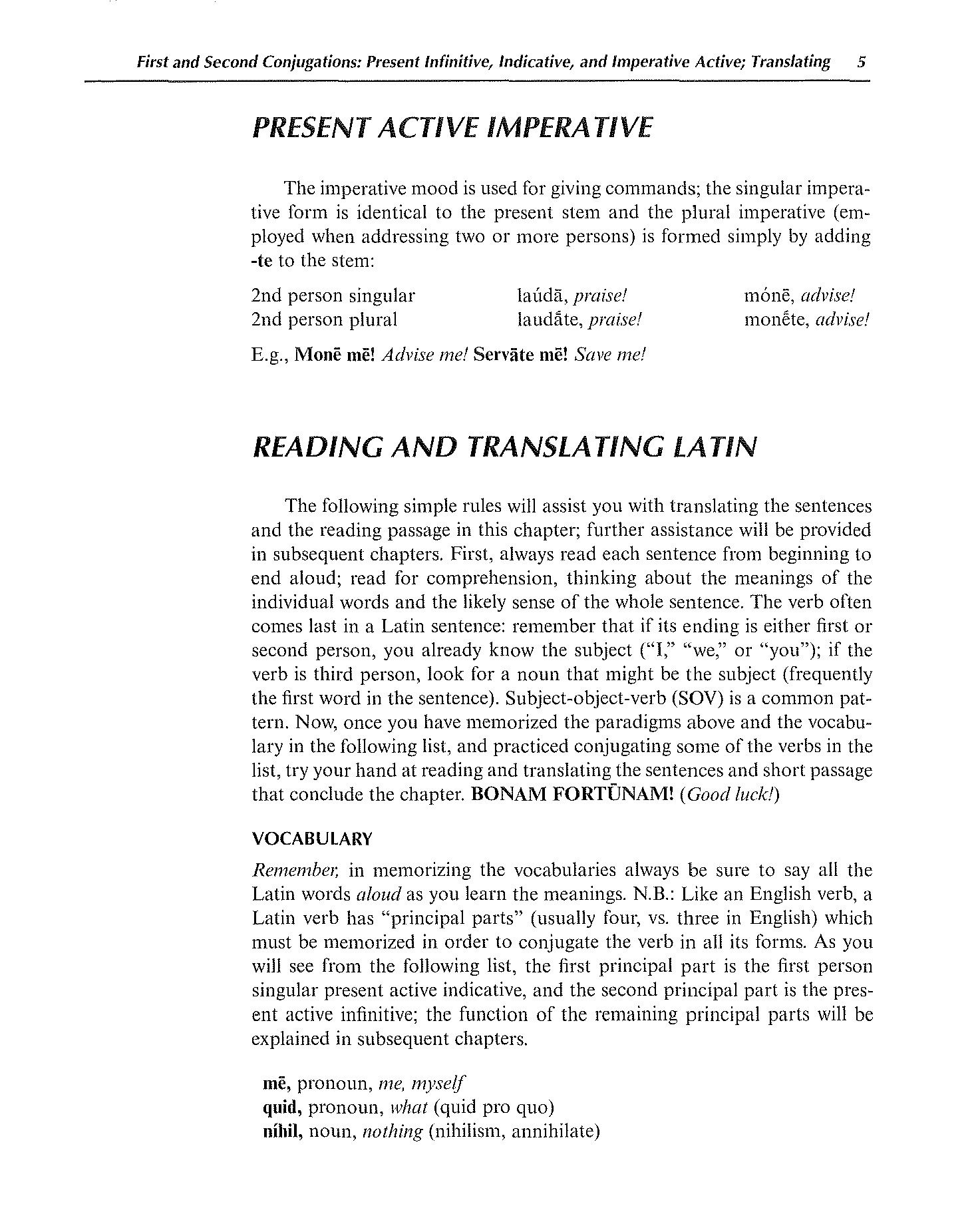
page_listing.tpl
page_subListingDetails.tpl
sub_listingDetails_style1.tpl
sub_listingDetails.title.tpl
nihil nothing
nihil is a Latin Noun that primarily means nothing.
Definitions for nihil
Wheelock's Latin
Noun
- 1
nothing
English derivatives:
nihilism annihilate
Oxford Latin Dictionary
Noun
- 1
Not anything, nothing.
- 2
That which does not exist, nothing.
- 3
A thing (matter, etc.) not worth mentioning or considering, nothing of importance, a trifle, (in replies), it doesn't matter; nothing compared to. (b) a person of no account, a nonentity.
Sentences with nihil
Latin to English
Sī rēs pūblica nostra valet, nihil tibi timendum est.Compare If our republic is strong, nothing is to be feared by you (sg.).
Numquam satis ōtiī habēbit; at aliquid ōtiī melius est quam nihil.Compare Never will he have enough leisure; yet some leisure is better than nothing.
Nihil metuendum est quod animō nocēre nōn possit.Compare Nothing is to be feared which cannot injure the soul.
Nihil arduum mortālibus est; caelum ipsum stultitiā petimus.Compare Nothing is (too) arduous for mortals; we seek the sky itself in our folly.
Est enim amicitia nihil aliud nisi omnium divinarum humanarumque rerum cum benevolentia et caritate consensio, qua quidem haud scio an excepta sapienta nil quicquam melius homini sit a dis immortanlibus datum. (De Amicitia, 20)Compare Friendship is nothing else than an accord in all things, human and divine, conjoined with mutual goodwill and affection, and I am inclined to think that, with the exception of wisdom, no better thing has been given to man by the immortal gods.
Post mortem nihil est ipsaque mors nihil, velocis spatii meta novissima.Compare There is nothing after death, and death itself is nothing, the final goal of a course full swiftly run.
Aut amat aut odit mulier: nihil est tertium.Compare Woman either loves or hates: nothing in between.
Asperius nihil est humili cum surgit in altum. [In Eutropium, 181]Compare Nothing is so cruel as a man raised from lowly station to prosperity.
Declension table for nihil
Cactus2000
| Singular | Plural |
Data sources
Notes
- Definitions
- Frederick M. Wheelock, Wheelock's Latin, 6th ed., rev. Richard A. LaFleur (New York, NY: HarperCollins Publishers, 2005): 5.
- P. G. W. Glare, Oxford Latin Dictionary, Vols. 1-8 (Oxford: Clarendon Press, 1982): 1177.
- Word frequencies
- Christopher Francese, "Latin Core Vocabulary," Dickinson College Commentaries, last modified 2014, http://dcc.dickinson.edu.
- Paul B. Diederich, The Frequency of Latin Words and Their Endings, PhD diss., (Columbia University, 1939).
Bibliography
Allen, Joseph H. Allen and Greenough's New Latin Grammar for Schools and Colleges: Founded on Comparative Grammar. Edited by James B. Greenough, George L. Kittredge, Albert A. Howard, and Benjamin L. D'Ooge. Boston, MA: Ginn & Company, 1903.
Crystal, David. A Dictionary of Linguistics and Phonetics. 6th ed. Oxford, UK: Blackwell Publishing, 2008.
Delatte, Louis, Suzanne Govaerts, Joseph Denooz, and Etienne Evrard. Dictionnaire fréquentiel et index inverse de la langue latine [Frequency Dictionary and Inverse Index of the Latin Language]. Liège, Belgium: Laboratoire d'analyse statistique des langues anciennes de l'Université de Liège (L.A.S.L.A.), 1981.
Diederich, Paul B. The Frequency of Latin Words and Their Endings. PhD diss., Columbia University, 1939.
Francese, Christopher. "Latin Core Vocabulary." Dickinson College Commentaries. Last modified 2014. http://dcc.dickinson.edu/latin-vocabulary-list.
Gildersleeve, Basil L., and Gonzales Lodge. Gildersleeve's Latin Grammar: Third Edition, Revised, and Enlarged. 3rd ed. London, England: Macmillan and Co., 1903.
Glare, Peter G.W. Oxford Latin Dictionary. Vols. 1-8. Oxford, England: Clarendon Press, 1982.
Krüger, Bernd. "Latin Conjugation Tables." Cactus2000. Accessed May 5, 2023. https://latin.cactus2000.de/index.en.php.
Pierson, Nick. "Sound of Text." Accessed October 26, 2019. https://soundoftext.com.
Wheelock, Frederick M. Wheelock's Latin. 6th ed. Revised by Richard A. LaFleur. New York, NY: HarperCollins Publishers, 2005.
Wiktionary Contributors. "Victionarium." Wikimedia Foundation, Inc. Updated March 18, 2019. https://la.wiktionary.org/wiki/Victionarium:Pagina_prima.
Citation
Chicago (17th ed.)
Allo Contributors. "nihil (n.) - Latin Word Definition." Allo Latin Dictionary. Last modified . Accessed February 19, 2026. http://ancientlanguages.org/latin/dictionary/nihil.
Entry created on . Last updated on .







